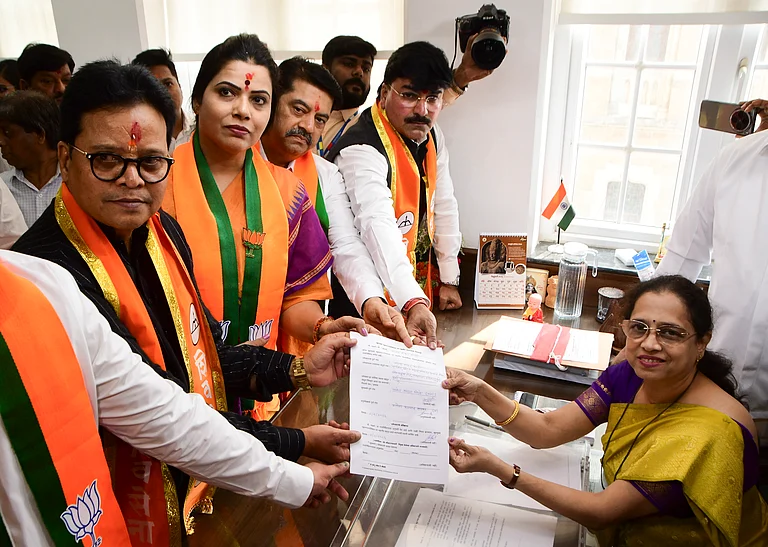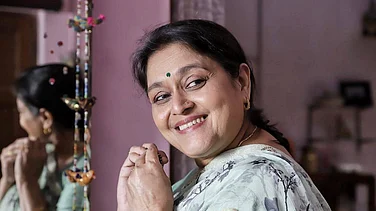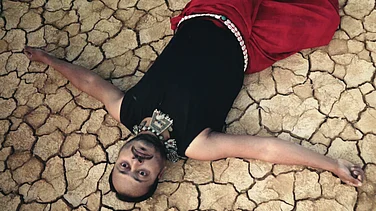
DIFF was founded by filmmakers Ritu Sarin and Tenzing Sonam, who established DIFF as a space for independent and art-forward cinema.
Known for championing new and diverse voices, the festival is now in its fifteenth year as a platform for fresh, global storytelling.
The following interview dissects and commemorates their journey towards helping independent voices thrive.
When filmmakers Ritu Sarin and Tenzing Sonam moved to Dharamshala in the late 1990s, they found a place full of activity but without a contemporary cultural space. “We thought, why not start a small festival here where people can experience independent cinema?” says Sonam. The couple, both independent filmmakers, co-founded the Dharamshala International Film Festival (DIFF) in 2012.
In this conversation with Siddhant Vashistha for Outlook, Ritu Sarin and Tenzing Sonam speak about sustaining art in turbulent times, the changing language of film, and why hope remains at the heart of everything they do. Edited excerpts:
What led you to start DIFF?
Tenzing Sonam: Ritu and I have been making films independently for most of our adult lives. When we moved to Dharamshala in the late 1990s, we realised that although the town was lively, it lacked a contemporary cultural platform. Because we had been to many film festivals, we thought of creating a small one here—a space where local audiences could experience independent cinema.
We started in 2012. There were no proper cinemas, so we showed films on DVD. From the beginning, we decided to bring filmmakers too, because that’s what makes festivals interesting. Many friends came in those early years. We had people like Hansal Mehta, Umesh Kulkarni, Asif Kapadia just by requests. It was a basic setup, but audiences loved meeting the filmmakers. The festival grew on its own. Every year more people came, and it became larger than we had imagined.
Ritu Sarin: We had already been living here (Dharamshala) for many years. Having travelled to festivals as independent filmmakers, we thought it would be good to do something for our community. Dharamshala has a very diverse population, and cinema was a way of bringing people together. There were no theatres, so we used auditoriums and projectors. Initially, it was on DVD and Blu-ray, and later on DCP. We wanted to bring contemporary culture to our town.
Did you see DIFF as a platform for independent cinema from the beginning?
Tenzing Sonam: Yes. We make indie films ourselves, and we knew we didn’t need to promote commercial cinema. Independent films need that platform. We wanted to show local audiences that there are other ways of making films—more personal and meaningful ones. That also encouraged people to tell their own stories. Over the years, we developed initiatives like the DIFF Himalayan Film Fellows, which mentors filmmakers from the Himalayan region, and DIFF on the Road, which takes our films to other parts of the country.
DIFF is now known internationally and sells out every year. Did you ever imagine this?
Ritu Sarin: No, never. It started as a small community event, and we didn’t think beyond that. But it grew each year, and now, entering our 15th year, it feels like a milestone.
Tenzing Sonam: It’s rewarding to see how it’s evolved. What’s most fulfilling is when young filmmakers who once attended as audiences return with their own films. That sense of continuity means a lot. The premieres and recognition are gratifying, but the main satisfaction comes from knowing the space helps people grow.
How do you see filmmaking changing today from the time you began, especially with technology evolving so fast?
Ritu Sarin: When we started, it was film and early video—analogue editing, physical film reels. Access to equipment was difficult, so there were fewer films being made. Now, the barriers are gone. You can make a film with an iPhone if you want. That has made the process more democratic, and there are so many more stories being told.
In our time, you had to go to a cinema to watch a film. Now you can watch anything online. People can see old classics, world cinema, and the like, and that has made audiences more film-literate, which changes the language of cinema itself. The grammar of film is evolving all the time.
As for the future, it’s hard to predict. AI will definitely become part of it. The question is, what happens to personal voices? Will it become harder to tell deeply human stories because of technology? We don’t know yet. But I do think there need to be policies and guardrails to protect independent cinema and creativity. That’s difficult because it requires a global consensus, but it’s important.
Tenzing, you’ve mentioned that cultural spaces are shrinking. How does that affect DIFF?
Tenzing Sonam: It’s true, the cultural space is shrinking. Support for the arts, and especially for independent cultural institutions like DIFF, is becoming more difficult to sustain. Every year, we face funding challenges. Even though we’ve grown and people see the festival as successful, the financial support hasn’t really kept pace with that growth.
Despite that, I’m optimistic. When I see the films being submitted every year, especially short films from young filmmakers, they’re tackling an incredible range of subjects—sometimes very brave ones. These are difficult times politically and socially, but young filmmakers are not deterred. That gives me a lot of hope. It tells me that creativity and innovation are still very much alive.
Both of you have spoken about hope. Where do you find it in these turbulent times—politically, culturally, even technologically?
Ritu Sarin: I think hope is inbuilt in filmmaking. You can’t make a film without hope. You make a film and you think, “Am I just going to show it to my family? Am I just going to show it to my ten friends?” I mean, no filmmaker really knows. When you are starting out, you don't know how many people are actually going to watch your film. But you still do it, because you have some kind of belief that it matters. That’s hope.
Tenzing Sonam: Exactly. Despite all the uncertainty, human beings have a need to create and connect. As long as that continues, spaces like DIFF will continue.



























